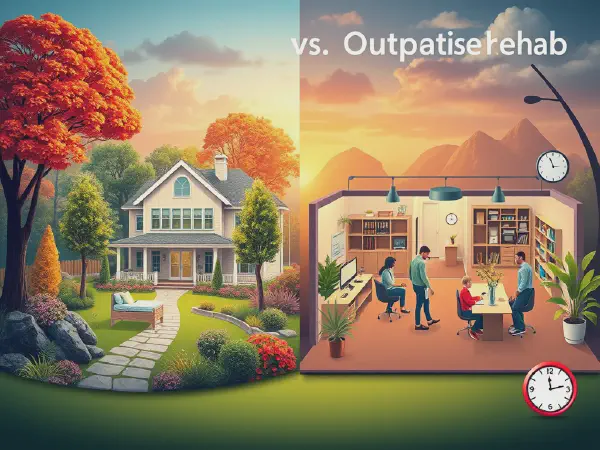Inpatient vs. Outpatient Rehab in Northport: Key Differences

Inpatient vs. Outpatient Rehab in Northport: A Comprehensive Guide
Navigating the path to recovery from substance abuse or addiction can be daunting, especially for individuals seeking help in Northport. One of the first critical decisions is understanding the options available for rehabilitation, particularly the differences between inpatient and outpatient rehab programs. This article delves into the intricacies of Inpatient vs. Outpatient Rehab in Northport and aims to provide clarity for those seeking recovery solutions.
Inpatient rehab programs offer a structured environment where individuals live on-site at a treatment facility for the duration of their recovery program. This immersive treatment approach allows for constant supervision, intensive therapy, and a distraction-free environment. On the other hand, outpatient rehab allows individuals to reside at home while attending scheduled treatment sessions, providing more flexibility to balance personal responsibilities. Understanding the nuances of Inpatient vs. Outpatient Rehab in Northport can help individuals make informed decisions that align with their recovery needs.
The choice between inpatient and outpatient rehab often boils down to the severity of addiction, individual circumstances, and personal preferences. Inpatient rehab is typically recommended for those with severe addiction issues, co-occurring disorders, or a history of relapse since the residential setting promotes a high level of care and support. Conversely, outpatient rehab may be suitable for individuals with milder addictions who have a stable home environment and support system. The goal is to align the choice of rehabilitation with the person’s unique recovery journey, which varies from one individual to another.
In Northport, both inpatient and outpatient rehab programs offer a wide array of therapeutic approaches, including individual counseling, group therapy, and holistic therapies. While inpatient programs generally provide a more intense level of treatment with 24/7 supervision, outpatient programs offer valuable resources and therapy in a more flexible setting. Ultimately, understanding the pros and cons of each approach is crucial to ensuring the best possible outcomes in the recovery process. This article will explore the specifics of each rehab type, including benefits, ideal candidates, success rates, and other important factors to consider.
This comprehensive guide aims to shed light on the essential aspects of Inpatient vs. Outpatient Rehab in Northport, helping individuals and families navigate the complexities of addiction treatment. By understanding the differences, benefits, and potential challenges associated with each option, those seeking help can make more informed decisions as they embark on their path to recovery.
Understanding Inpatient Rehab
Inpatient rehab is a comprehensive treatment process characterized by round-the-clock care and support within a dedicated rehabilitation facility. Participants in inpatient programs reside at the center for a specific period, which varies based on the treatment plan and individual progress. This immersive environment is designed to provide a structured approach to recovery, allowing individuals to focus solely on their healing journey without the distractions of everyday life.
Some of the significant benefits of inpatient treatments include constant medical supervision, intensive therapy options, and a stable environment free of triggers such as substance access or negative influences. Many facilities also offer a range of holistic therapies, nutritional support, and skill-building workshops in addition to standard behavioral therapies. Inpatient rehab fosters a sense of community among participants, which can enhance motivation and foster peer support.
The duration of an inpatient stay usually ranges from 30 days to several months, depending on the severity of the addiction and the individual's response to treatment. Some facilities may even provide extended care options for those in need of additional support after the initial program. Thoughtful planning and progress assessment help in determining the right length of stay for each participant, with the goal of ensuring a successful transition into the next stage of recovery.
Recent studies highlight the significance of cellular mechanisms in disease progression, as discussed in detail at https://pubmed.ncbi.nlm.nih.gov/8391147/.
Ideal candidates for inpatient rehab typically include individuals with severe substance abuse issues, those experiencing co-occurring mental health disorders, or individuals who have relapsed after previous outpatient treatments. The structured setting of inpatient rehab is advantageous for those who require a higher level of care and support. Families and friends can also benefit from inpatient programs, as they provide a greater sense of safety for the recovering individual and help foster healthy dynamics.
Success rates for inpatient programs are often higher than those for outpatient rehab, particularly in cases of severe addiction. These programs have been shown to lead to more sustained abstinence and a deeper understanding of addiction and recovery. However, the ultimate success largely depends on the individual's commitment to the program and the support systems established during and after treatment.
Understanding Outpatient Rehab
Outpatient rehab is a treatment option that allows individuals to receive care while continuing to live at home. Participants attend scheduled treatment sessions at a rehab facility but are free to maintain their daily responsibilities, such as work or family obligations. This setup provides more flexibility than inpatient programs, making it a suitable choice for many individuals seeking recovery.
Outpatient rehab programs offer numerous benefits, including affordability, flexible scheduling, and enhanced independence. Patients can attend therapies, counseling sessions, and support groups that fit into their existing routines, allowing for a balance between treatment and personal life. Additionally, outpatient programs often extend the duration of therapy, which can facilitate healthier long-term habits.
One of the defining features of outpatient treatment is its flexibility. Individuals can choose between daytime, evening, or even weekend programs, allowing them to participate in treatment without sacrificing work, school, or family commitments. This enables participants to apply the skills learned during therapy in real-time, reinforcing recovery within their everyday environments.
Outpatient rehab is typically suitable for individuals with mild to moderate substance abuse issues, those with a strong support system, and those who do not require 24-hour supervision. It serves as an excellent option for people who have completed inpatient treatment and need continued support or those who are in the earlier stages of addiction. Assessing the individual's situation carefully is key in determining if outpatient rehab is the right path.
Regarding cost, outpatient programs generally tend to be more affordable than inpatient options since participants do not incur the costs of room and board at a treatment facility. Many insurance plans cover outpatient rehab, making it a financially viable choice for many individuals seeking recovery. It's essential to verify coverage options with your insurance provider to understand the specifics of the program being considered.
Comparative Analysis of Both Options
When comparing inpatient and outpatient rehab, there are several key differences to consider. The most apparent is the environment of care; inpatient rehab provides a structured, controlled environment, while outpatient rehab allows for treatment within the individual's home setting. Inpatient programs may offer more intensive therapy options but require complete immersion, whereas outpatient programs allow for flexibility with less direct supervision.
Situations favoring inpatient rehab often include a history of severe addiction, a lack of support at home, or co-occurring mental health challenges that require more supervision. Conversely, if an individual has a stable lifestyle, good support, and a low to moderate level of addiction, outpatient rehab can provide effective treatment without the need for residential accommodation.
Outcomes of inpatient vs. outpatient treatments can vary significantly based on the individual's commitment and circumstances. Studies indicate that inpatient patients may have higher short-term success rates due to the immersive nature of treatment, but outpatient programs can also produce positive long-term results for motivated individuals, particularly those with support systems in place.
Patient experiences and testimonials often highlight differing perspectives on inpatient and outpatient rehab. Some individuals thrive in the structured environment of inpatient care, benefiting from intense support and community, while others appreciate the independence offered by outpatient programs, which allows them to integrate treatment into their everyday lives more seamlessly.
Cost-effectiveness is an important consideration for many when deciding between inpatient and outpatient rehab. While inpatient programs are generally more expensive due to their immersive nature, outpatient programs can be a more budget-friendly option, especially for individuals without extreme addiction levels or significant co-occurring disorders.
Choosing the Right Rehab Option
When determining the right rehab option, several factors should be considered, including the severity of addiction, underlying health issues, personal responsibilities, financial aspects, and individual preferences. One must also assess their environment and the availability of support systems, as these can influence recovery outcomes immensely.
The consultation and assessment process is crucial when choosing between inpatient and outpatient treatment. Most facilities will conduct comprehensive evaluations to determine the best course of action for each individual. This may involve reviewing medical history, assessing addiction severity, and discussing personal circumstances and goals to tailor the treatment plan effectively.
Family support plays a significant role in the decision-making process for rehab selection. Engaging loved ones in discussions about treatment preferences can help individuals feel more supported and understood in their recovery journey. Family involvement in therapy sessions can also lead to healthier dynamics post-rehab, facilitating better long-term recovery outcomes.
Assessing a patient’s lifestyle is a vital step in determining the most suitable rehab option. Factors such as job demands, childcare responsibilities, and living conditions can significantly affect the choice between inpatient and outpatient treatment. A personalized approach ensures that the selected rehab option aligns with an individual's life, needs, and recovery goals.
Resources for finding local rehab centers in Northport, including online directories, community mental health organizations, and referrals from healthcare professionals, can be valuable. Many facilities offer initial consultations to help individuals better understand their services, allowing for educated decisions when selecting the right program for recovery.
Aftercare and Long-term Recovery
Aftercare programs post-rehab are essential for maintaining recovery progress and preventing relapse. Both inpatient and outpatient programs typically offer structured aftercare options that include continued counseling, support groups, and additional resources designed to reinforce coping skills and recovery strategies learned during treatment.
Support groups are another vital component of aftercare that can enhance long-term recovery efforts. Organizations such as Alcoholics Anonymous (AA) and Narcotics Anonymous (NA) provide community support, accountability, and a sense of belonging that can be invaluable following rehab.
Continuing care is an important aspect to consider for both inpatient and outpatient patients. Regular follow-up appointments with treatment providers, participation in group sessions, and accessibility to therapy can all facilitate sustained recovery, helping individuals stay committed to their path of sobriety.
Long-term success rates for both inpatient and outpatient programs can be quite positive, particularly for those who stay engaged with aftercare and support systems. Research indicates that individuals who maintain ongoing connections with support groups and professionals are more likely to experience sustained abstinence and improved overall well-being.
Planning for life after rehab is a critical part of the recovery process. Establishing personal goals, creating coping strategies, and building a healthy, supportive environment can help individuals navigate the challenges of everyday life while maintaining their commitment to sobriety. Whether attending an inpatient or outpatient program, success in recovery requires ongoing effort, resilience, and support.
